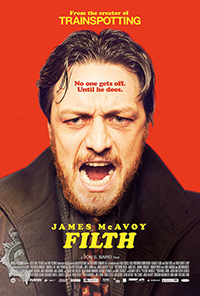Bad Detective: Baird Adapts Welsh for (Sometimes) Outrageous Effect
 Danny Boyle’s 1996 classic Trainspotting set the bar for Irvine Welsh adaptations (Boyle is apparently at work on a sequel), and several filmmakers afterward have followed in his footsteps without the same success. But director Jon S. Baird’s sophomore film, Filth comes close to the same wild energy and outrageous affection with the help of a notable cast and an uncomfortable turn from a sallow James McAvoy. Certainly, the film isn’t going to be everyone’s cup of tea, a loosely followed plot frittered away on episodic craziness that only becomes more compounded as the film progresses. But despite the crassness, the degradation, and various other offensive counts that rightfully earns the story title, there’s an undeniably enduring quality to Baird’s adaptation as something you won’t be soon to forget, filled with moments that, by the surprisingly pithy final frames, will undoubtedly provoke or unnerve.
Danny Boyle’s 1996 classic Trainspotting set the bar for Irvine Welsh adaptations (Boyle is apparently at work on a sequel), and several filmmakers afterward have followed in his footsteps without the same success. But director Jon S. Baird’s sophomore film, Filth comes close to the same wild energy and outrageous affection with the help of a notable cast and an uncomfortable turn from a sallow James McAvoy. Certainly, the film isn’t going to be everyone’s cup of tea, a loosely followed plot frittered away on episodic craziness that only becomes more compounded as the film progresses. But despite the crassness, the degradation, and various other offensive counts that rightfully earns the story title, there’s an undeniably enduring quality to Baird’s adaptation as something you won’t be soon to forget, filled with moments that, by the surprisingly pithy final frames, will undoubtedly provoke or unnerve.
A Japanese student is murdered by a roving gang, setting off the investigation that threads through Filth, though seems to disappear consciously into a blend of office politics, sexual indiscretions, and wounded heartache of Detective Bruce Robertson (McAvoy). The film opens with a brightly hued and heavily filtered introduction of his wife, Carole (Shauna Macdonald), who pops up here and there in odd transitions, until we finally realize that she’s no longer involved with her haywire husband, a man that holds no qualms about blackmailing a 14 year old to fellate him or harassing the wife of his friend Blades (Eddie Marsan) for kicks. His only real goal seems to be securing a promotion to inspector over his haphazard colleagues.
As every bit unhinged as his white collar counterpart Patrick Bateman in American Psycho, Detective Bruce Robinson is so unabashedly forlorn in a sea of binging (sex, drugs, booze, more sex), self-loathing, and social disease (from halfhearted homophobia to rampantly typical misogyny) that he’s a borderline tragic figure; he’s Bad Lieutenant by way of William S. Burroughs. That’s not to say that Baird doesn’t also give us a glorious streak of dark humor to chew through, not to mention an impressive array of notable names in its cast.
While Imogen Poots and Martin Compston feel a bit underutilized, there are some brilliant bits with Eddie Marsan, playing a schlubby accountant that also happens to be McAvoy’s only real friend. Marsan is paired once again with the imp voiced and incomparably hilarious Shirley Henderson, star of Trainspotting (it’s worth nothing that these two played a downtrodden couple in the excellent miniseries Southcliffe as well), here a big-haired, sex-starved maven receiving prank phone calls from Robertson. Likewise, Jamie Bell and Gary Lewis, father and son from Billy Elliott star as his colleagues, and he cuckolds another co-worker with a wife played by Kate Dickie, with whom sex centers on autoerotic asphyxiation, here termed “cutting off the gas.” And then, for a little fantastical flourish is Jim Broadbent as McAvoy’s therapist, popping up as a surreal footnote with increasing regularity in his brain, birthing images of cartoon-like hyperbole in everyone he interacts with. Most enjoyable, however, has to be McAvoy, here a malignant tumor of a protagonist, miles away from the downtrodden guys he’s usually pegged as, that are either troubled toughies as in Trance or pining nice guys as in the forthcoming The Disappearance of Eleanor Rigby.
Then, of course, there’s a doozy of a reveal that shouldn’t be divulged in any review. Needless to say, it’s a fun one, but is swiftly followed by a series of unnecessary explanations as to Robertson’s actions. But, before the equally uncalled for end credits, Filth screeches to a halt with a moment of stunning bleakness, startling enough to forgive Baird’s clichéd soundtrack, consisting of an all too pointed cover of Radiohead’s “Creep,” which is every bit as uninspiring as the Christmas tune overplaying a Japanese student being beaten to death at the onset. While the frenetic abandon could very well be on purpose, Filth could very well benefit from some tightening up or reigning in of divergent styles (particularly within its sometimes gratingly clichéd introduction of characters) without sacrificing its dark vision.


